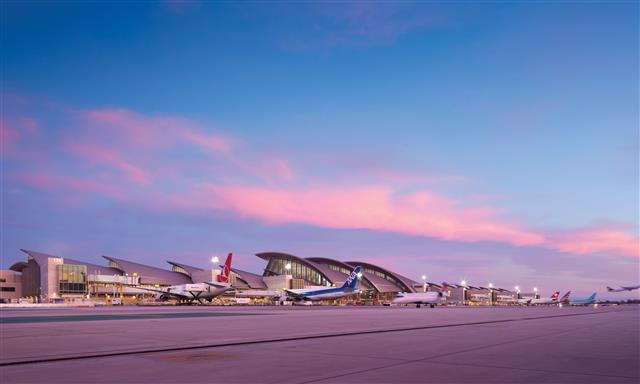Source: LAWA
Airfield view of Tom Bradley International Terminal. Courtesy Los Angeles World Airports.
- Commitment to Carbon Neutrality by 2045 on Track for Success
Dedicated to practices that strengthen accountability, transparency and public trust, Los Angeles World Airports (LAWA) issued its 2022 Sustainability Report. In 2007, LAWA officially formalized its commitment to sustainability with the publication of its Sustainability Vision and Principles. These values were further bolstered in 2017 with the ratification of LAWA’s Sustainable Design and Construction Policy which dictates that all new building construction achieve LEED Silver or higher and outlines sustainability requirements for major facility renovation projects, and non-building landside and airside projects. Subsequently, in 2019, LAWA adopted its Sustainability Action Plan where, in alignment with the City of Los Angeles’s policies, it committed to achieving net zero in the following areas by 2045: 100% renewable electricity use; zero potable water for non-potable uses; and carbon neutrality for LAWA operations. The new 2022 report provides insight into the progress of these initiatives in addition to documenting other activities which have generated sustainable and economic success at LAWA’s airports and in their surrounding communities.
“LAWA’s 2022 Sustainability Report highlights our efforts to provide and enhance sustainability across all LAWA’s activities, including the transformation of Los Angeles International Airport (LAX). Our success is credited to the dedication of our employees and tenants, as well as to our partnerships and support from local agencies, organizations and business partners and the leadership of Mayor Bass and her vision for a sustainable city,” said Justin Erbacci, Chief Executive Officer, LAWA. “Meeting and exceeding our goals and milestones, LAWA will continue to be a leader in sustainable aviation, ultimately achieving carbon neutrality by 2045.”
Key highlights of LAWA’s sustainability performance in 2022 include:
- Early achievement of 2025’s goal of a 15% reduction of energy use per passenger;
- Increased Sustainable Aviation Fuel usage at LAX;
- Meeting 2023’s goal of a 20% zero emissions bus fleet;
- Meeting 2025’s goal of 25% waste diversion;
- Receiving the first delivery of unleaded aviation fuel for general aviation aircraft at Van Nuys Airport (VNY);
- Receiving the first delivery of train cars, which are made from fully recyclable aluminum shells, for the Automated People Mover (APM);
- Updating LAWA’s Electric Vehicle (EV) Purchasing Policy to require a 25% EV sedan fleet by 2023 and a 100% EV sedan fleet by December 2031;
- Achieving Envision Gold certification for the APM;
- Establishing the LAX Residential Sound Insulation Program (RSIP) to provide sound insulation for approximately 2,385 eligible units in El Segundo and City of Los Angeles communities near LAX;
- Increasing the number of acres irrigated with reclaimed water to 66.8% of all landscaped areas at LAX;
- Receiving two awards for LAX’s Economy Parking Facility that recognize its innovative and unique design for sustainable construction;
- Hosting and sponsoring 65 community and employee engagement events.
“Sustainability is embedded in our culture here at LAX and our staff and partners have embraced sustainability holistically across the campus,” said Samantha Bricker, Chief Sustainability and Revenue Management Officer, LAWA. “Working with our partners, we have been able to make substantive progress towards achieving the goals outlined in our Sustainability Action Plan.”
While LAWA’s sustainability program is foundational to all of LAWA’s activities, including financial and social sustainability, LAWA has focused on the following topics which are of vital importance to LAWA, our partner organizations and stakeholders. These issues include:
- Energy management, to reduce energy impacts;
- Water management leading to efficient operations and to reduce water use;
- Air emissions measures that achieve an ongoing reduction of air pollutants;
- Material resources management to address waste reduction, recycling, and re-use;
- Noise management to minimize aircraft noise affecting communities;
- Natural resources management with restoration projects and other wildlife conservation programs;
- Corporate responsibility to ensure business and workforce inclusion.
Interested parties can learn more about LAWA’s industry-leading sustainability commitments and policies at bit.ly/LAWA-Sustainability.

